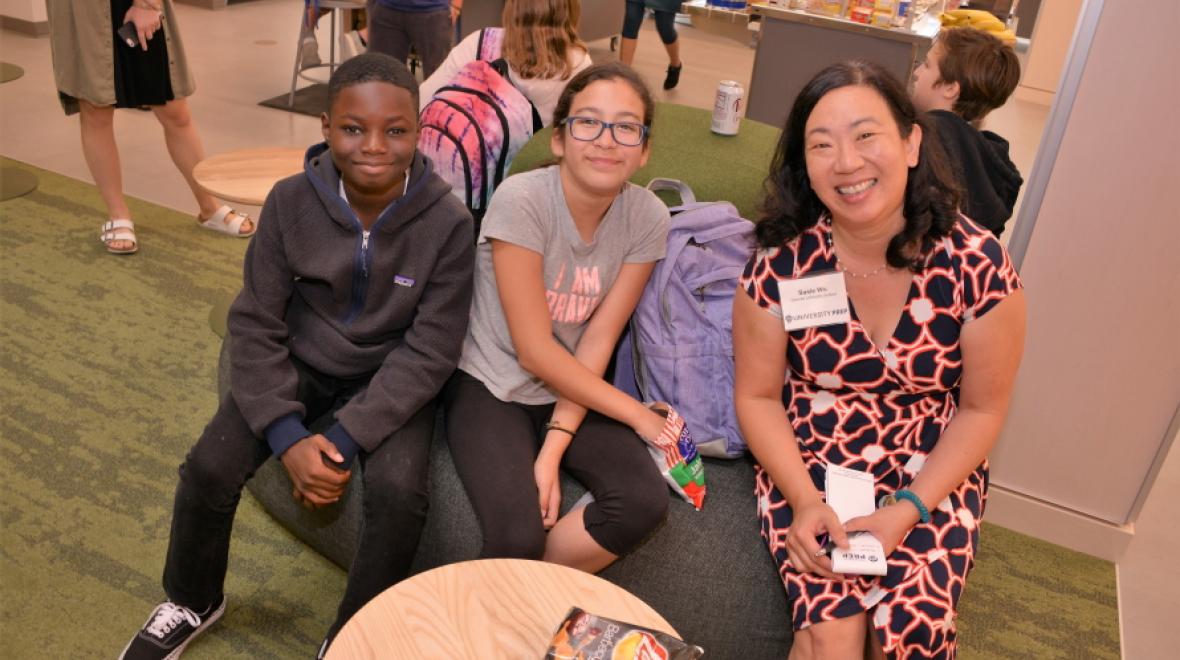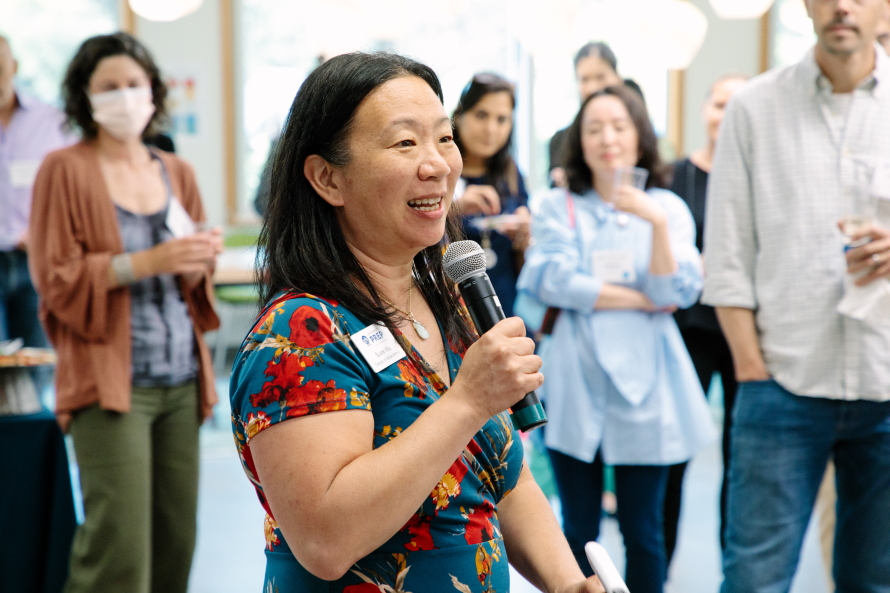
Photo:
Courtesy University Prep
Editor's note: This article was sponsored by University Prep.
University Prep Middle School Director Susie Wu has 30 years’ worth of experience as a teacher and education administrator. A former high school science teacher who taught in public schools in Boston and Cupertino, California, prior to moving to Seattle, Wu served 17 years as the director of leadership development for Rainier Scholars, a 12-year program that offers a pathway to college graduation for hard-working, low-income students of color, before joining the UPrep staff in 2018.
Now in her fifth school year in this role, Wu is quick to note that her background is not in teaching middle-school-age students. “For 25 years, I worked solely with high school students — prior to taking on this position, I was really nervous about it!” she admits.
But who better to shepherd and coach the particular developmental and academic promise and potential of middle school students than a longtime high school educator?
ParentMap had the very enjoyable opportunity to speak with Wu to gain her insights into ways that the middle school years are an opportune crucible for our kids to explore and develop character, self-aware confidence, personal agency and leadership skills in preparation for high school — and life.
What do you love about working with middle-school-age kids?
When many of us think of middle school, we reflect on our own possibly chaotic experience. I ended up going to three different middle schools. It was such a tumultuous time in my life. What I have found at UPrep is that these kids are incredibly joyful and unfiltered. They have so much energy! Our middle school students are so earnest. Earnest about their passions, earnest about talking to adults, and earnest about getting their validation or approval. And they are so true with each other.
The teachers and advisers who work here really enjoy middle school kids; they roll with the punches. They find those opportunities to say to a student, ‘Hey, you’re doing great’ or ‘Hey, you know that you could have done that a little bit better, right?’ They are very patient and very accepting. The adult community at UPrep — and their social-emotional lean-ins for this particular age group — makes it a joyful environment, too.
What skills do middle-school-age students need to work on to prepare them for high school, and what modeling do teachers and administrators provide to assist with that?
Of course, the academic curriculum is really the anchor of what schools do. But I do think of two essential things: I want our middle school students to have confidence in what their strengths are and an awareness of where they have areas of potential growth. I also want them to come out of these three years knowing they don’t have to be perfect.
I think our adults — the families and the teachers and advisers — play a big role in helping our students to piece together what they’re good at based on the progress they’re making, and where they might need to develop skills and continue growing. Naming those areas for our students is key. If you learn any lesson in life, it should be about self-reflection and acting on that reflection, but this is a skill that takes practice. We give our students opportunities to try things and then reflect on how they went.
Oftentimes the most difficult thing for our families is striking that balance between independence and support. Learning when your child is ready to navigate those areas of independence is the hardest thing to figure out. UPrep is a small community, one where adults are very tuned in to the students, so we can partner with our families to help students navigate independence. We give them the instructions, we let them try it out, then we follow up with them. That practice — of honing that confidence and self-awareness — is what I want our students to have before they enter ninth grade.
What programs at UPrep support students in exploring their passions and talents?
A lot of our students arrive with a much greater sense of social issues in the world — and with a desire to make change. So, we hold up our middle school clubs to students. They’re not after-school clubs — instead, they take place during the day, twice a week — and students get to create clubs that are focused on their interests. It’s a natural way to bring like-minded students together, say around Magic: The Gathering or creative writing.
One club last year was called Ancient and Historical Weapons, and another was called Cleaning for the Frogs. [The latter] was started by a couple of students who wanted to help keep the campus clean, and they had an interest in frogs. We didn’t overregulate it; we didn’t say, “Oh, that doesn’t make sense from an adult point of view.” We just said, “Okay, sure. What is your club’s purpose?”
Our no-cut athletics program also encourages students to try out sports. We have students who have years of experience in particular sports, and we have some who we’ve never tried them before. What I have seen repeatedly — is that there are students who say, “I’m going to take the Musical Theatre class and be in the musical, even though I’ve never sung before.” And there isn’t this preconceived notion of, “Oh, you’re not a theatre person.”
During my middle school years, I never ventured into certain courses or activities because I wasn’t an “art person.” At UPrep, there’s a broader swath of things for students to try, and there seems to be a peer culture that accepts trying new things as the norm. You try something, and you might find you’re good at it, or you might find you’re not. But there isn’t any social stigma attached to it, either way.
How do you help your students learn how to navigate their emotions during the middle school years?
Well, in our school, we’re lucky. We have staff members who are in charge of setting our social-emotional curriculum across the entire school. We embed it in a lot of our advisory work in the middle of the day, and we have workshops and other ways by which we can systematically and regularly engage our students in conversations with each other about how you navigate certain situations.
One of my favorite SEL [social-emotional learning] workshops happens before the first dance of the year. It includes concepts around consent. Our SEL director talks about the ways that you can ask somebody to dance — and the specific ways that you can say no if you don’t want to dance.

That kind of programming happens on a regular basis, but some of the more powerful reinforcements happen on a daily basis. Adults model social-emotional strengths as they interact with each other and with their students: How we do things is just as important as what we do right. We demonstrate healthy ways of coping as well as model how we get through disagreement or conflict together.
How do you think about your role in embodying social-emotional leadership?
As I’ve moved into school leadership roles, I’m very aware of how visible I am. Even if I’m not doing or saying anything, people are looking at me. Whenever we as a community are beset with a difficult situation — somebody has wronged somebody else, or there’s some other conflict — I make sure I’m actually standing up and saying, “This is what my stance is. This is what I want from you.” It takes me time and a lot of effort to make sure that how I’m saying it is very clear, but I want our students to see me as a leader who communicates where she stands. I never want my middle school students to wonder, Does Ms. Wu know about this? Why didn’t she do anything about that? Why isn’t she hearing us? I try to present a balanced view: I understand there are multiple perspectives, but this is where I stand, and this is why I believe this is the best decision for our community. And I know that not everyone is going to agree with me. It is a role that I do take, and that helps me address situations as they arise.
When we have a big current event or if something’s going on that I know the adults are all talking about, sometimes I raise the topic to the students instead of pretending that they don’t know. Or I think about where we are in the school year. If I know, for example, that we’re headed towards a stressful period of time, I will name that for them: Hey, if you’re feeling this, you are not the only one. Everyone is kind of stressed out, and it’s normal to feel stressed out. We’ll all pace ourselves and ride this through together.
A huge amount of my response is about reassuring them that they aren’t the only one feeling that way. We’re so locked into our view and personal experiences, so it’s oftentimes in those moments of vulnerability that we’re less likely to reach out and say, “The reason why you’re stressed is actually because everyone around you is stressed.”
There is also just wave after wave of concerning news from the universe. When we were growing up, I felt that adults were very good at putting a veneer over upsetting things going on in the world. With the rise of social media, our students started having direct access to the information — which I think is a good thing — and they’re way more aware nowadays. It’s harder now to pretend that we [adults] have our act together. [With respect to the pandemic], we have never experienced anything like it, so kids are seeing adults not actually knowing what the answers are, in a way that has never happened before, or at least not in a way that I can recall in my lifetime.
As an educator and as a parent of both a middle and a high school student, how do you think parents can best help foster social-emotional skills?
I thought of the metaphor of parenting as kneading dough when I was watching “The Great British Baking Show.” A lot of parenting in middle school and high school is about that active kneading process. You have to know when to put the dough aside to let it rise. If you knead it too much, that affects the outcome. But you also don’t want to let it proof too much on its own, for too long. I tell parents that there’s no scientific way of doing this just right. [The process] is about calibrating a response to your individual child in the moment, where they are; and one child in your family will be totally different than the other child.
Ultimately, parenting a middle school child is about balancing when to step back and when to step in. Your child still needs you but will push you away when they want to make the decision themselves. It’s difficult, because we want to be the best parents for our children and we often ask ourselves, “Should I be doing more? Maybe I should have done this or done that.” I remind parents that sometimes the most powerful gift we give to our children is to create space for them to figure it out themselves.
This kneading-proofing balance is difficult during the middle school years, because they’re still young enough that you don’t want them to fail. It’s gradual — sixth through eighth grade is three years of kind of figuring out that process, which is probably one of the most important engagement skills to develop as a parent.
Sometimes our kids will fail, but in those moments, we parents need to remember that this is the best that our child can do right now — and we’re here to help them.












